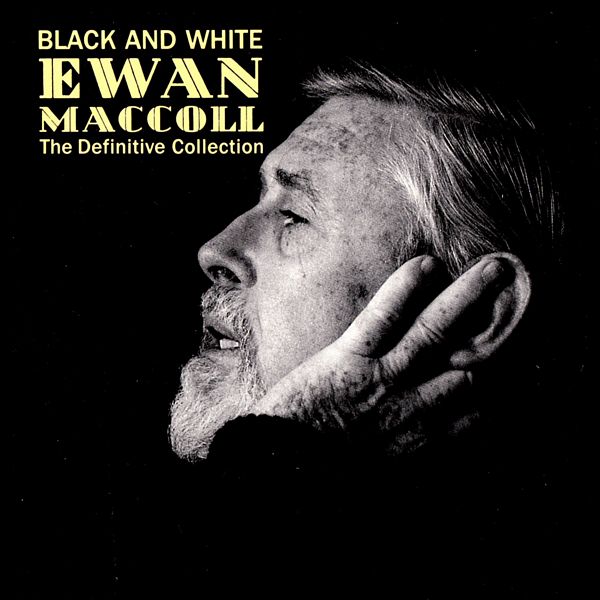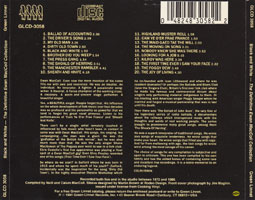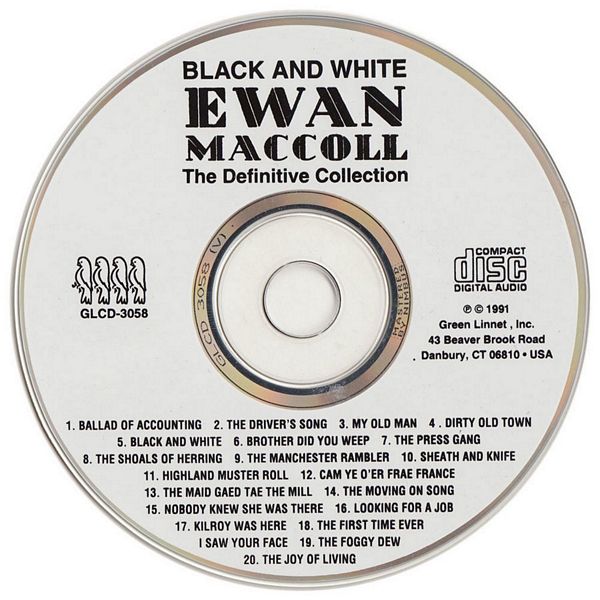

 |
 |
 |


|
Ewan MacColl. Even now the mere mention of his name fills me with awe and reverence. He was an idealist, an individual, an innovator. a fighter, a passionate song-writer. A theorist. A fierce champion of the working class. A visionary, a warm and sincere stage performer. A beautiful singer.
Yes, a BEAUTIFUL singer, People forget that. His influence on the whole development of folk music over four decades was so profound and his personality so powerful that we tend to forget his great vocal prowess, Listen to his performances of 'Cam Ye O'er Frae France' and 'Sheath and Knlfe'.
There can't be a single artist remotely touched or influenced by folk music who hasn't been in contact in some way with Ewan MacColl, His songs, his singing, his campaigning … the man was a giant. He was the 'godfather of the British folk revival', but he was also much more than that. He was the only singer Shane MacGowan of The Pogues ever went to see in a folk club. Elvis Costello's first live appearance was playing a floor spot at a Ewan MacColl gig! Even Elvls Presley recorded one of his songs ('First Time Ever I Saw Your Face').
So where do we start? In Salford where he was born in 1915 and where he spent much of his youth? (Salford, incidentally was the inspiration for the song 'Dirty Old Town'), in the highly innovative Theatre Workshop which he co-founded with Joan Littlewood and where he was resident dramatlst? Or perhaps the Ballads and Blues Club (later the Singers Club), Britain's first ever folk club where he made his famous and controversial dictum about singers only performing material indigenous to them. Or his meeting with American singer Peggy Seeger whom he married and forged a musical partnership that was to last until his death.
Then there was The Ballad of John Axon', the very first of his legendary series of radio ballads, a documentary about the railways which interspersed music with the thoughts and words of real working people. The series brought to prominence many great songs, among them The Shoals Of Herring'.
He was a superb interpreter of traditional songs, He wrote love songs of exquisite tenderness, He wrote songs that broke your heart. He wrote songs that filled you with rage. And far from mellowing with age, the last songs he wrote were among the most savage of his career.
The choice of songs for any compilation is subjective and open to criticism, This one has been compiled by his own family and has the added bonus of containing some rare and excellent live recordings, it is a noble memorial to an enduring legend.
COLIN IRWIN
BALLAD OF ACCOUNTING — Written In 1964 as theme music for the BBC radio-series "LANDMARKS", this is a summing-up song, an accounts sheet. Its Brechtian style and deceptive simplicity mark It as unique among MacColl's compositions.
Guitar and Vocals: Peggy Seeger
Recorded in 1972
THE DRIVER'S SONG — The radio ballads were eight radio programmes put out by the BBC between 1957 and 1964. Ewan conceived the form, wrote the scripts and the songs; Peggy worked with him on these, arranged the music and directed the recording In the studio; Charles Parker produced them. They were masterpieces of creative documentary, interweaving songs, sound effects, musical interludes and recorded speech. The Driver's Song' is from the radio-ballad SONG OF A ROAD (1960) and is based on the recordings of Jack Hamilton, an Irish bulldozer driver.
5-String Banjo: Peggy Seeger
Recorded: Pathway Studios, London, 1983
Producer: Neill MacColl
Engineer: Nick Godwin
MY OLD MAN — Ewan's father was an iron-moulder, blacklisted most of his working life for militant union activities. He runs like a constant thread through the first half of Ewan's autobiography, JOURNEYMAN. His politics, his love of books and his vibrant involvement In life stayed with Ewan until he himself was an old man, when he finally allowed his feelings to surface Into this song.
Guitar: Peggy Seeger
Recorded: Pathway Studios, London, 1980
Producer: Neill MacColl
Engineer: Nick Godwin
DIRTY OLD TOWN — This song, written In 1950 to facilitate a scene change In a Theatre Workshop production, has been covered by many singers. It celebrates Salford, Lancashire, the northern industrial town where Ewan grew up. Salford bears the same relationship to Manchester as does the Pireaus to Athens; it was the town of Friedrich Engels, the classic industrial revolution slum city much of which has since been torn down and replaced with new slums.
Guitar and Vocals: Peggy Seeger
Clarinet: Bruce Turner
Recorded: Pathway Studios, London, 1983
Producer: Neill
MacColl
Engineer: Nick Godwin
BLACK AND WHITE — One of three songs written Immediately after the Sharpeville Massacre in 1963.
Vocals and Guitar: Peggy Seeger
Recorded in 1972
BROTHER DID YOU WEEP — When the Folksingers for Vietnam was formed, a number of singer-songwriters wrote songs about the war and our involvement In It. Ewan wrote many of which this was the most popular.
Vocals and Guitar: Peggy Seeger
Recorded in 1972
THE PRESS GANG — From medieval times, the English crown claimed the power to press able-bodied subjects into the navy for the defense of the realm. With the passage of time, the power was abused and the press gang, Invading the small towns and roaming the country-side, became a truly feared 'tradition', as witnessed by the scores of press gang songs. In 1853 the long service system was introduced and the need for press gangs virtually disappeared.
Recorded live In Chicago, November 20,1982
THE SHOALS OF HERRING — A song from another radio-ballad, SINGING THE FISHING (1960). It Is based on the life of Sam Lamer, a herring-fisherman of Wlnterton. Norfolk, whose life spanned the eras of sail, steam and diesel fishing craft. This song has been found in Ireland bearing the title The Shores Of Erin', and credited to anonymous or traditional.
English Concertina and Guitar: Peggy Seeger
Recorded: Pathway Studios, London, 1983
Producer: Neill MacColl
Engineer: Nick Godwin
THE MANCHESTER RAMBLER — One of the earliest of MacColl's songs, written in the early 1930's, this is widely believed to be a traditional folksong. You can still hear walkers singing it in the pubs on rambles. It was written In 1932 for the mass trespass over Kinder Scout, Derbyshire, when 3,000 unarmed walkers and hikers faced gamekeepers with clubs and police with truncheons. Many of the ramblers went to prison for their action. A plaque in the Edale Tourist information office celebrate both the trespass and this song.
Bass: Dill Katz
Vocals and Whistle: Calum MacColl
Vocals and Guitar: Neill MacColl
Vocals and Banjo: Peggy Seeger
Vocals: Kirsty & Hamish MacColl
Harmonica: Chris Taylor
Fiddle: Ian Telfer
Recorded: Pathway Studios, London, 1983
Producer: Neill MacColl
Engineer: Nick Godwin
SHEATH AND KNIFE — This spectacular Incest ballad, with Its hair-raising denouement and Its dramatic poetic devices, Is an outstanding example of the genre. Ewan loved the traditional ballads above all forms of folksong — the economy of language, the stark dramatic form, the presentation of the conflicts In society as seen through the eyes of individuals who are at the mercy of social pressures.
Recorded live in Seattle, November 16, 1984
HIGHLAND MUSTER ROLL — For years Ewan opened concerts with this song, which he would use partly to test the acoustic, partly to check what condition his voice was in, but mostly because It is such a glorious song. It is a rallying call summoning the clans to battle and it was made and sung around the time Earl of Mar raised the standard for King James in the North. Ewan Identified strongly with the struggle of the Scots people to maintain their national Identity. He learned this song from his father.
Recorded live in Cambridge, Mass., October 24, 1981
CAM' YE O'ER FRAE FRANCE? — When George I Imported his seraglio of Impoverished gentlewomen from Germany, he provided the Jacobite songwriters with material for some of their most ribald verses. Madame Kilmansegge, Countess of Platen, Is referred to exclusively as The Sow' In the songs, while the king's favourite mistress, the lean and haggard Madame Schulemberg (afterwards created Duchess of Kendall) was given the name of 'The Goose'. She is the goosie referred to In this song. The blade is the Count Konlngsmark. Bobbing John Is a reference to John, Earl of Mar, who at the time this song was made was recruiting Highlanders for the Hanoverian cause. Geordie Whelps is, of course, George I himself.
5-String Banjo: Peggy Seeger
Recorded live in Chicago, Ill., September 11, 1984
THE MAID GAED TAE THE MILL — Ewan wrote: 'This song belongs to the end of the first quarter of an all-male drinking session or at the end of the third quarter of a mixed party. It has a nice blend of sly bawdiness calculated to make the not-so-young remember incidents they thought they had forgotten. I learned It from my father.'
Recorded live in Gettysburg, November 3, 1982
MOVING-ON SONG — In the course of collecting actuality for "The Travellers", the radio-ballad on nomadic peoples, we recorded the following passage from Misty Smith, a gypsy woman In Cobham, Kent: "I was expecting one of my children, y'know, one of my babies, and my son ran for the midwife. The policeman came along, 'Come on', he said, 'get a move on! Shift on! Don't want you here on my beat.' So my husband says, 'Look, sir, let me stay — my wife Is going to have a baby.' 'No, it doesn't matter about that,' he says, 'you get off!'. They made my husband move and my baby was born going along while my husband stayed on the road. Born on the crossroads is my caravan. The horse was in harness and the policeman was following along, y'know, drumming us along. Born on the crossroad!".
Guitar: Peggy Seeger
Guitar and Vocals: Calum MacColl
Bass: Dill Katz
Vocals: Hamish & Neill MacColl
Recorded: Pathway Studios, London, 1983
Producer: Neill MacColl,
Engineer: Nick Godwin
NOBODY KNEW SHE WAS THERE — Ewan's mother, Betsy Hendry Miller, Inspired this song with her lifetime of toil as a woman who cleaned offices and other people's houses, who took In laundry and mending to keep her son and her asthmatic husband, She died at the age of 96, a tough, wiry but worn out little woman.
Appalachian Dulcimer: Peggy Seeger
Recorded: Pathway Studios, London, 1980
Producer: Nelll MacColl
Engineer: Nick Godwin
LOOKING FOR A JOB — Employment and unemployment, and how they affect family and personal life, were a constant motif running through Ewan's childhood. His father was out of work, through ill health and militant politics, for most of his 'working' life. When Ewan left school continual unemployment drove him to rambling the moors, to read compulsively, to work In theatre and in leftwing politics. He never forgot what it was like to be continually unemployed: the degradation, the lack of confidence, the feelings of worthlessness and rejection by society. This song was a departure from Ewan's usual preference for traditional poetic forms.
Guitar: Peggy Seeger
Recorded: Falconer Studios, London, 1986
Producer: Calum MacColl
Engineer: Harum Coombes
KILROY WAS HERE — 'Kllroy Was Here' first appeared during the Second World War, scrawled on walls of bomb sites and on the sides of tanks. 'Kilroy' Is the Invisible survivor, the anonymous hero who came to symbolise the toughness of the one who not only gets up after the battle and walks away but allows himself time to let you know he has done so.
5-string Banjo and Supporting Vocals: Peggy Seeger
Recorded: Pathway Studios, London, 1980
Producer: Neill MacColl
Engineer: Nick Godwin
THE FIRST TIME EVER I SAW YOUR FACE — Written for Peggy Seeger in 1957, this song has been covered by many popular singers and was taken to the top of the charts In the U.S.A. by Roberta Flack.
Vocal and Guitar: Peggy Seeger
Recorded: Pathway Studios, London, 1983
Producer: Neill MacColl
Engineer: Nick Godwin
THE FOGGY DEW — One of the most common of the English country love songs, this piece began originally as a story about a girl who was afraid of 'the bugaboo1. The young man takes her in his arms to comfort and protect her. The term bugaboo, in this version, has become the foggy dew.
Recorded live in St Louis, Missouri, April 27,1986
THE JOY OF LIVING — Ewan's love of life, his Involvement in politics, his passionate attachment to the traditional music and to theatre never abated, even with the onset of ill health and old age. Although not the last song he wrote, this was meant as a farewell to the world and to the people he loved.
Supporting Vocals, Guitar, Banjolin and English, Concertina: Peggy Seeger
Recorded: Falconer Studios, London,1986
Producer: Calum MacColl
Engineer: Harum Coombes,
Mixed: Steve Lillywhlte and Kirsty MacColl